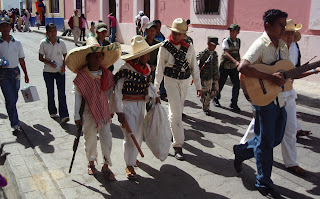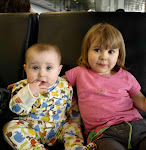Daisy takes her first trip to the beach, to Chiapas’ busiest seaside resort, a place called Puerto Arista.

It’s a five hour drive in the university truck, borrowed by Enrique, so we all get up at six in order to make the trip there and back possible in a day.
Road trips in Mexico are an entirely different experience from at home. For a start, any villager who fancies it can set up huge speed bumps called ‘topes’ in the main roads, forcing everyone to slow down sharply or crash.
Road signs implore passing cars not to tear down the signage (but what happens if they tear down the signs telling them not to tear down the signs?) and not to put rocks in the road.
We stop in a town called Cintalapa for a somewhat bizarre breakfast. The woman in the restaurant (perhaps that’s giving it too strong a name), would have done well in Monty Python’s cheese shop. She has run out of orange juice and eggs, and most importantly, gas.
The gas man has not come round yet, so we end up eating tacos cooked on a barbecue grill with apricot flavoured Fanta. Not a breakfast I would recommend.
Things perk up when we finally reach the sea. For a busy resort on a public holiday, Puerto Arista is… tranquil, as well as 30 degrees. We set up camp under a palapa shelter and Daisy gets to try out her first hammock, which she rather enjoys.

Then, slathered in Factor 50 and without even a nappy, we take her for a first dip in the sea, which she seems to really like. Baby Pablo is less keen and cries like a big wuss.
Puerto Arista is a seaside resort for Mexicans, which is refreshing compared to the tourist beaches around Cancun. All the food on offer in the restaurant is seafood with tortillas, while local people come round with trays selling whatever it is they have cooked that morning – fish tacos, empanadas, cheesecake and various other unidentifiable items.

Due to a slight misunderstanding, we end up with far too many coconut cocktails, which are a potent mixture of gin, coconut milk and mint (a cross between a gin and tonic and a very good Mojito). We thought we ordered two, but end up with six, which we drink anway.
Paul and I fail to learn our lesson from the baby massage, and allow Daisy some nappy off time in the hammock, which gives her the chance to bless my legs, herself, and the hammock abundantly. Just as well the sea was there to wash us off.
She also discovers her feet, which she can now grasp and play with, which seems to occupy her for most of the day.

The trip back takes on a nightmarish quality, thanks in the main to coconut-cocktail and sun induced headaches. I try not to scratch my sandfly bites, and everyone gets more and more tired. For the final leg of the journey everyone’s squeezed in the front except for Pabs who sleeps wrapped in blankets out at the back of the truck. We finally arrive home at 11pm, ready to sleep. It takes a while to convince Daisy that the party is over, but she finally falls asleep, probably dreaming of the biggest bath in the world.



















































